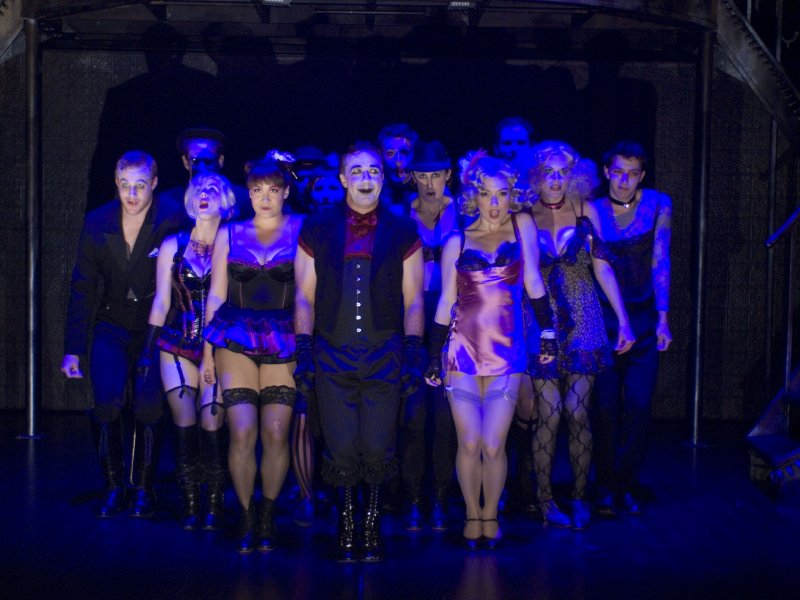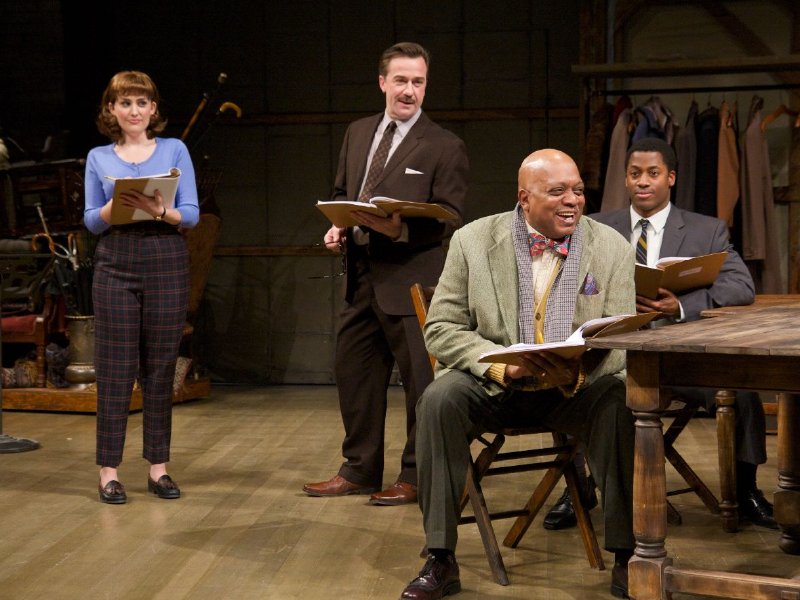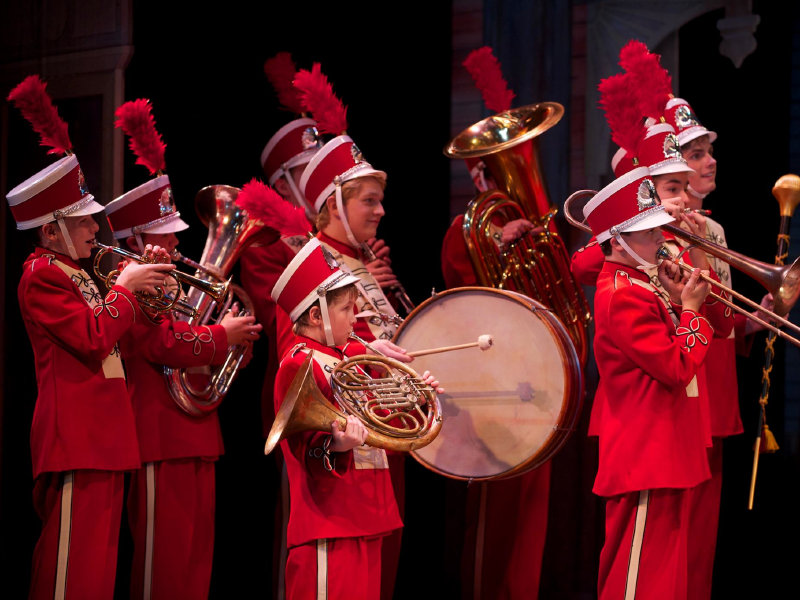When a major theater company chooses a new artistic director, that person's style and esthetic are frequently known to the troupe's employees and customers. Guest directing gigs are often dates between a prospective artistic director and a theater searching for a new creative leader. They can size each other up, get a sense of whether a permanent union would be a good fit.
Joe Hanreddy, who ended his run as the Milwaukee Rep's artistic director in June, was highly familiar to the state's theater-goers when he arrived in Milwaukee in the early ‘90s because of his previous body of work at the Madison Rep and the American Players Theatre.
But new Milwaukee Rep artistic director Mark Clements has been a professional unknown to us since his appointment was announced with much fanfare nearly a year ago. Clements has personally endeared himself to many folks with his affable nature and eagerness to collaborate. All of his professional work has been on the East Coast and in his native England, and we didn't know what to artistically expect from him.
The first returns are now in, and they are impressive. The Clements-directed production of "Cabaret" that opened the Rep season last weekend is an intense and compelling piece of theater. It reveals a strong director's hand with a confident command of stagecraft and the ability to select and follow through on a theme.
The Kander and Ebb musical is a contemporary classic, and with three different stage versions plus a hit movie, there is considerable room for playing with the dials to turn up the volume on some elements and lessen others. It's a director's choice.
Casting an eye toward modern political extremism, Clements decided to accentuate the story, with content given precedence over style. His Kit Kat Klub would still make Howard Stern blush, but the sexual debauchery of a Weimar Republic nightclub is not the enduring image we have of the Rep's "Cabaret." Instead, we shudder with the steady march toward violent fascism we observe over a six month period beginning on New Year's Eve, 1929.
Clements' tone and symbolism hew closer to "Cabaret's" source material, Christopher Isherwood's two novellas collectively titled "The Berlin Stories," than some other productions. That doesn't mean it lacks Broadway glitz, clever theatricality and memorable stage moments.
Lee Ernst's opening scene entrance, descending from the ceiling on a lowered chandelier, will wake up anyone preparing for a post-dinner snooze. More on Ernst's portrayal of the Kit Kat Klub emcee later.
Clements has said his directing style includes a fondness for evocative lighting, and we get that from designer Jeff Nellis, whose use of shadows sets a mood for the shadowy forces of evil lurking throughout the musical. His lights greatly complement Todd Edward Ivins' richly vibrant costumes. Ivins also designed the set.
Dance plays a larger and more meaningful role in this "Cabaret," a result of Clements' invitation to Milwaukee Ballet Company artistic director Michael Pink to choreograph the show. Pink's work is exciting, dynamic and suggestive of the cultural and political decadence in Germany between the world wars.
Glimpses of the exuberant energy of the Charleston are contrasted with deliberate steps and formations that augur the coming militarization of Europe.
With "Cabaret" being the first full-scale musical the Rep has staged, there are many new faces in the 33-person cast. However, it's the familiar local actors who shine in the production.
All "Cabarets" begin and some end with the Emcee character. He sets the table and then continually returns to maintain an atmosphere and provide information. If he is weak, the production falters.
Lee Ernst's Emcee is a slick and slippery shape-changing presence, posing like Mick Jagger and observing on the fringes of the action. He leers, jeers and mocks. He's our detached guide into a depraved fun house.
Ernst has memorably played everyone from Cyrano de Bergerac to Frank Lloyd Wright on the Powerhouse Theater stage. Here he is the devil, beckoning us with a strut and a smirk.
Linda Stephens, portraying the rooming house operator Fraulein Schneider, and Jonathan Gillard Daly, as her Jewish suitor, use sincerity and simplicity to be poignantly human, while Angela Iannone contributes a rough and tumble sexiness in her portrait of the sailor-loving roomer Fraulein Kost. Milwaukee newcomer Kelley Faulkner is a particularly crisp and confident Sally Bowles when we first meet her. That sets up Sally's slide into desperation and Faulkner's harrowing second act rendition of the show's title song.
American writer Clifford Bradshaw is a blandly undeveloped character in Joe Masteroff's book for the musical, and although Geoffrey Hemingway sings the role very well, his flat acting adds nothing to the role.
Beginning with Faulkner, the entire cast shows itself to be Broadway caliber in the song and dance elements of "Cabaret." A four-piece orchestra perched in a band box above the stage is augmented by the chorus boys and girls of the Kit Kat Klub who also play a variety of musical instruments.
Bare Bones for Next Act
While the Rep is filling its main stage with lush costumes, sets and 33 actors, Next Act Theatre is going minimalist with an extremely spare stage, few props and four actors. The play is the nearly unknown "Four Places," but the emotional impact it and the Next Act production deliver is as powerful as "Cabaret's."
The 80-minute drama unflinchingly addresses one of life's most wrenching issues -- adult children becoming parents to their physically and mentally failing parents. Even in the most functional of families, the moment when the children feel compelled to assert control over their parents' lives is painfully difficult. If unpleasant baggage from the past accompanies that, the situation can be hellish.
Chicago playwright Joel Drake Johnson tackles the subject head-on in showing us a middle-aged brother and sister nervously taking their elderly mother to lunch. We know they are about to stage some sort of intervention in her life. "Four Places" engrosses its audience by gradually revealing more and more about the dynamics of the family.
The no-nonsense, economical writing prevents the play from sliding into soap opera or melodrama, and the story is not neatly wrapped up at the end. Nary a false move can be found in the plot.
As a result, our sympathy continually shifts during the single act. Sometimes we feel for the siblings, and at other times their mother grabs our allegiance.
Flora Coker so thoroughly inhabits the mother character, one doubts she is acting. She starts with her naturally quite charm and deftly adds flashes of irritability, anger and intransigence.
Mark Ulrich and Mary MacDonald Kerr effectively convey the children's skittishness while exposing some individual family wounds. Laura Gray's meddling waitress possesses a patronizing unctuous warmth that appropriately produces a fingernails-across-a-chalkboard effect. David Cecsarini directed.
Next Act Theatre is in transition this season as it awaits the opening of its new Fifth Ward performance space in 2011. This is the first of three productions it will mount in In Tandem Theatre Company's Tenth Street Theatre.
Damien has been around so long, he was at Summerfest the night George Carlin was arrested for speaking the seven dirty words you can't say on TV. He was also at the Uptown Theatre the night Bruce Springsteen's first Milwaukee concert was interrupted for three hours by a bomb scare. Damien was reviewing the concert for the Milwaukee Journal. He wrote for the Journal and Journal Sentinel for 37 years, the last 29 as theater critic.
During those years, Damien served two terms on the board of the American Theatre Critics Association, a term on the board of the association's foundation, and he studied the Latinization of American culture in a University of Southern California fellowship program. Damien also hosted his own arts radio program, "Milwaukee Presents with Damien Jaques," on WHAD for eight years.
Travel, books and, not surprisingly, theater top the list of Damien's interests. A news junkie, he is particularly plugged into politics and international affairs, but he also closely follows the Brewers, Packers and Marquette baskeball. Damien lives downtown, within easy walking distance of most of the theaters he attends.







